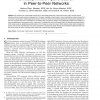Free Online Productivity Tools
i2Speak
i2Symbol
i2OCR
iTex2Img
iWeb2Print
iWeb2Shot
i2Type
iPdf2Split
iPdf2Merge
i2Bopomofo
i2Arabic
i2Style
i2Image
i2PDF
iLatex2Rtf
Sci2ools
ICPP
2007
IEEE
2007
IEEE
Difficulty-aware Hybrid Search in Peer-to-Peer Networks
—By combining an unstructured protocol with a DHT-based global index, hybrid peer-to-peer (P2P) improves search efficiency in terms of query recall and response time. The major challenge in hybrid search is how to estimate the number of peers that can answer a given query. Existing approaches assume that such a number can be directly obtained by computing item popularity. In this work, we show that such an assumption is not always valid, and previous designs cannot distinguish whether items related to a query are distributed in many peers or are in a few peers. To address this issue, we propose QRank, a difficulty-aware hybrid search, which ranks queries by weighting keywords based on term frequency. Using rank values, QRank selects proper search strategies for queries. We conduct comprehensive trace-driven simulations to evaluate this design. Results show that QRank significantly improves the search quality as well as reducing system traffic cost compared with existing approaches.
DHT-based Global Index | Difficulty-aware Hybrid Search | Distributed And Parallel Computing | Hybrid Search | ICPP 2007 |
| Added | 03 Jun 2010 |
| Updated | 03 Jun 2010 |
| Type | Conference |
| Year | 2007 |
| Where | ICPP |
| Authors | Hanhua Chen, Hai Jin, Yunhao Liu, Lionel M. Ni |
Comments (0)

